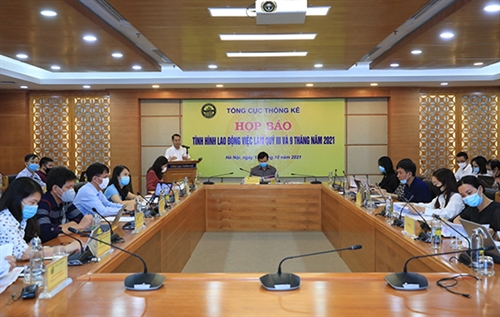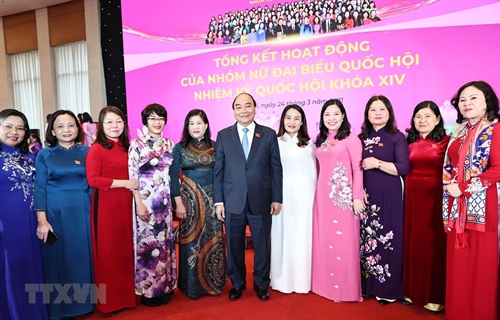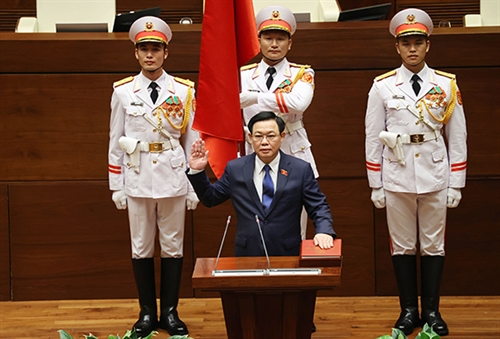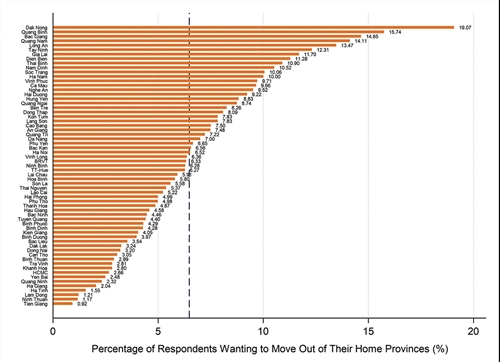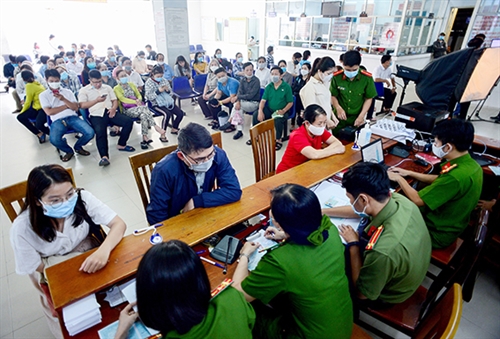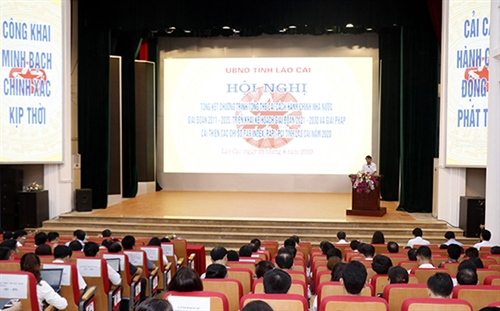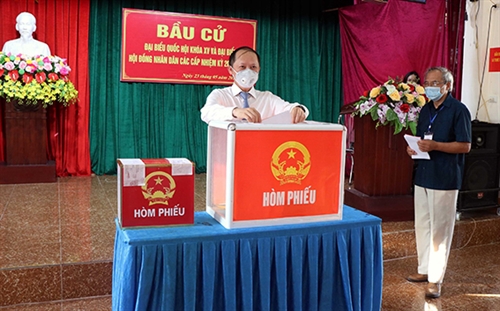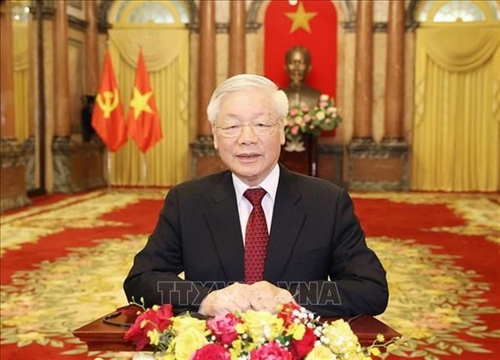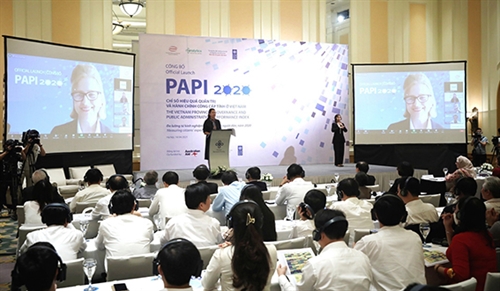On November 3, the National Conference to implement Politburo Conclusion 19/KL-TW on orientations for the lawmaking program of the 15th Legislature was held online. Talking to the Vietnam National Assembly Television Channel just before the conference, Chairman of the National Assembly’s Law Committee Hoang Thanh Tung makes it clear about the contents of Conclusion 19 as well as the Scheme on orientations for the legislative program of the 15th National Assembly.
After the Politburo issued Conclusion 19 on orientations for the lawmaking program of the 15th Legislature, how did the National Assembly and its agencies organize the implementation of this Conclusion?
Right after Conclusion 19 was issued, the Party Committee of the National Assembly has directed the assimilation of Politburo opinions and finalized the Scheme on orientations for the lawmaking program of the 15th National Assembly for submission to the Secretary of the Party Committee of the National Assembly for issuing a notice and sending it together with the Conclusion and the Scheme to all agencies and organizations within the political system from central to local levels for implementation. At the same time, the Party Committee of the National Assembly has assigned agencies, Party organizations, Standing Body of the Ethnic Council, and Committees of the National Assembly to study the Conclusion and the Scheme.
The Conclusion is of great importance with major contents, orientations and tasks regarding legislative activities to be implemented during the 15th tenure of the National Assembly. These are also major tasks of the National Assembly agencies. Hence, the Party Committee of the National Assembly has required related agencies to formulate their own plans to organize the performance of legislative tasks set forth in the Scheme. It has also assigned the Standing Body of the National Assembly’s Law Committee to work with related agencies in formulating a Plan of the National Assembly Standing Committee to implement the Conclusion and the Scheme.
What should be noted in organizing the implementation of the legislative program of the 15th National Assembly?
The Politburo has affirmed in the Conclusion that it approved the Scheme on orientations for the lawmaking program of the 15th Legislature and assigned agencies and organizations within the political system to pay attention to lawmaking activities with a view to achieving the legislative objectives during the 15th tenure of the National Assembly. The Conclusion also touches upon some noteworthy lawmaking issues.
Firstly, the lawmaking quality should be improved. In the Conclusion, the Politburo has set out requirements on legislative work of the 15th National Assembly, e.g., to focus on building the legal system to be complete, synchronous, uniform, timely, feasible, stable, transparent, and internationally competitive while centering on the legitimate rights and interests of the people and businesses. So, the pivotal task of legislative activities is not to serve state management but to protect the legitimate rights and interests of the people and businesses, thereby promoting innovation and devising solutions and measures to successfully realize socio-economic development objectives set forth by the 13th National Party Congress, ensuring rapid and sustainable national development.
In addition, the Politburo requires improvement of all stages of the lawmaking process in a prudent, tight and qualitative manner. This is expected to address shortcomings and limitations revealed through the implementation review of Politburo Resolution 48 on the Strategy for building and improvement of Vietnam’s legal system through 2010, with orientations toward 2020, and in the course of formulating the Scheme.
Secondly, it is a need to do away with limitations identified in legislative work. The Conclusion pointed to some shortcomings in lawmaking activities that need to be addressed. Specifically, the discipline and order in lawmaking activities were not stringent enough; some agencies and organizations engaged in the legislative process failed to strictly comply with document-promulgating procedures under the Law on Laws; in some cases the preparation of bills failed to meet requirements on drafting, appraisal, verification, and solicitation and assimilation of opinions of people and entities to be impacted by the documents, etc., thus making the quality of such bills unsatisfactory.
Another shortcoming is the instability of laws, i.e., certain issues in some laws were not considered carefully, making such laws infeasible and subject to revision after a short time of implementation. It is also a problem that “framework” laws (laws with unspecific provisions) were passed and therefore required numerous guiding texts in order to be enforced. Every now and then internal interests of state management agencies, ministries or sectoral authorities in charge of drafting legal documents are incorporated in contents of such legal documents while failing to focus on the protection of legitimate rights and interests of businesses and the people.
Thirdly, it is necessary to uphold the role of the stakeholders in lawmaking activities. The Conclusion asked the subjects engaged in the legislative process to further renew and improve the quality of lawmaking work. Specifically, the National Assembly agencies and deputies should take the initiative in performing legislative work and raising effectiveness of law enforcement oversight. For other subjects, particularly the Government, the Conclusion requires them to promote their dynamism and creativity, as well as their active and proactive role in legislative work because the Government plays a very important role in drafting and submitting draft laws to the National Assembly.
Fourthly, it is a must to create favorable conditions for lawmaking work and personnel engaged in this work. Accordingly, the Conclusion sets out requirements on collection of the people’s opinions, promoting the role of the Vietnam Fatherland Front and its member organizations in overseeing law enforcement and carrying out social criticism for draft laws. It also points to inadequacies in the capacity and qualifications of legislators and problems in assurance of conditions for facilitating the lawmaking work.
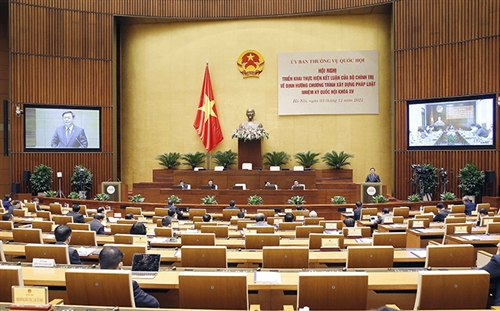 |
| The national videoconference on the implementation of the Political Bureau’s Conclusion on orientations for whole-tenure legislative program of the 15th National Assembly is held in Hanoi on Nov. 3__Photo: Doan Tan/VNA |
It can be affirmed that the 14th Legislature has inherited the lawmaking achievements of the previous tenures and promulgated a large number of laws, ordinances and resolutions, promptly institutionalizing the Party’s policies and guidelines and concretizing the 2013 Constitution to meet state management, socio-economic development and international integration requirements. Can you tell more about the outcomes of legislative work of the 14th Legislature?
During its 14th tenure, besides its tasks of conducting supreme oversight and deciding on important issues of the country, the National Assembly has made great efforts in promoting legislative work and promulgated a large number of laws, ordinances and resolutions. According to review reports, the 14th National Assembly issued a total of 126 laws, ordinances and resolutions, including 73 laws, 20 resolutions and legal documents of the National Assembly; and two ordinances and 31 resolutions of the National Assembly Standing Committee. It can be said that some of the passed laws have exerted strong impacts on the entire socio-economic life of the country, meeting practical requirements, such as the Planning Law, Law on Investment in the Form of Public-Private Partnership, Law on Prevention and Control of Tobacco Harms, and Law on Cyber Security.
The legislative outcomes of the 14th National Assembly have created a political-legal foundation for ensuring the stable and sustainable development of the country. This is one of the decisive factors that help our country achieve great and historical achievements in socio-economic development, national defense and security maintenance, and international integration in the last tenure.
What are the objectives and guiding viewpoints on lawmaking work set forth by the 15th Legislature and what are orientations for the lawmaking program of the 15th tenure?
The objectives of the lawmaking work are to complete development institutions, create a legal basis and framework for the successful implementation of socio-economic development tasks of the 2021-25 period associated with the realization of 12 orientations for national development, six major tasks and three strategic breakthroughs set forth in the Resolution of the 13th National Party Congress; promptly and fully institutionalize the Party’s guidelines and policies; build a complete, unified, feasible, public and transparent legal system that centers on the people and businesses while promoting innovation; and enhance the mechanism for controlling the exercise of the state power.
In addition, it is also important to promote the role of science and technology, especially to take advantage of opportunities brought about by the Fourth Industrial Revolution, laying down a new legal framework for the development of e-government, digital economy, digital government, digital society, and promotion of digital transformation.
The Scheme has determined five major guidelines for legislative work of the 15th National Assembly.
Firstly, the work of building and improving institutions must be placed under the strict and comprehensive leadership of the Party toward the goal for the people, ensuring respect for, and protection and guarantee of human rights and civil rights; maintaining political stability, and social order, safety and discipline.
Secondly, a complete legal corridor must be established to ensure that the State, state agencies, officials and civil servants operate and work within the framework of the Constitution and law, thereby establishing a complete legal relationship between the State and citizens.
Thirdly, it is a need to create real institutional breakthroughs to change the way of thinking in lawmaking work from management to development facilitation.
Fourthly, substantial democracy must be guaranteed in the lawmaking process. In this process, it is necessary to solicit opinions of the people, experts, scientists and activists. At the same time, impacts of policies proposed in draft laws should be assessed while ensuring collection of opinions of impacted subjects.
Fifthly, caution and strictness should be secured in formulating and promulgating laws in a qualitative manner.
Regarding orientations for the lawmaking program, the Scheme draws out eight major orientations that are related to (i) improvement of institutions of a socialist-oriented market economy; (ii) fundamental and comprehensive renewal of education and training; (iii) improvement of the legal system to meet requirements on sustainable social management and development and assurance of social justice with a focus on laws on social insurance and employment, protection and care of the people’s health, and pandemic prevention and control; (iv) completion of laws to meet requirements on natural resource management and use, environmental protection, and climate change response, especially the land law; (v) improvement of laws to meet requirements on maintenance of national defense and security, firm defense of national border sovereignty, territorial integrity and independence, and assurance of social order and safety; (vi) improvement of laws to meet international integration requirements; (vii) improvement of laws to meet requirements on promotion of the strength of the great national unity, socialist democracy and the people’s right to mastery; and (viii) further building of a socialist law-ruled state.
The above orientations will be concretized into specific legislative tasks. The Scheme also sets forth 137 lawmaking tasks relating to all fields of the socio-economic life. Therefore, in the time to come, related agencies will have to review existing laws with contents relevant to these orientations before proposing appropriate amendments.
Can you talk about some major contents of the draft Plan of the National Assembly Standing Committee to implement the Conclusion?
In the process of making preparations for implementation of the Conclusion, the Party Committee of the National Assembly and the National Assembly Standing Committee assigned the Standing Board of the National Assembly’s Law Committee to collaborate with related agencies to formulate a Plan of the National Assembly Standing Committee to implement the Conclusion.
The Plan has three major parts: requirements, tasks to be performed, and organization of implementation. The Plan aims to clearly define responsibilities of agencies and organizations in the political system, from the Government to National Assembly agencies, Government agencies, the Supreme People’s Court, the Supreme People’s Procuracy, the State Audit Office of Vietnam, ministries, sectors, and other agencies, in organizing the implementation of the Conclusion as well as proposing solutions to ensure the implementation.
Regarding tasks to be performed, the Plan identifies requirements for and contents of plans to be issued by related agencies and organizations for implementation of the Conclusion. For instance, for the Government and the Vietnam Fatherland Front’s Central Committee, their plans must clearly state specific contents and volume of legislative tasks, and time limits and contents of their reports, etc.
Particularly, the Ethnic Council and Committees of the National Assembly have to work out their plans suitable to the fields under their management and closely coordinate with Government agencies and others in performing legislative tasks and, at the same time, urge and supervise the task performance and report arising issues to the National Assembly Standing Committee for opinion.
The Plan specifies deadlines for reporting. For legislative tasks required to be completed by June 30, 2022, reports must be sent to the National Assembly Standing Committee before July 15; for other tasks to be completed in 2022, 2023 or 2025, reports must be sent before March 1 of the year following the reporting year.
The year 2022 is a “landmark” year for implementation of the Scheme because 95 out of the 137 legislative tasks mentioned above must be completely performed in 2022, requiring related agencies to expeditiously formulate their own plans for implementation of the Conclusion.
The Scheme on orientations for the legislative program of the 15th National Assembly provides eight groups of major orientations with 70 specific ones. What are solutions for the Legislature to completely implement the Scheme?
As the work load is very heavy, the agencies and organizations engaged in the lawmaking process must work out their detailed plans in adherence to the requirements set in the Scheme for implementation of Conclusion 19. Of these, the Government plays a very important role as the agency in prime charge of submitting draft laws to the National Assembly. The Government will assign ministries and sectors to draft laws or review issues already identified in the legislative tasks.
Another solution is to tighten discipline and order in lawmaking activities. Related agencies must strictly follow the order and procedures for making draft laws as provided in the Law on Laws, from the stage of making proposals for inclusion of draft laws in lawmaking programs, so as to ensure the quality of draft laws.
One more solution is to uphold responsibilities of heads of agencies in association with responsibilities of agencies assigned to assume the prime charge of formulating draft laws. This should be considered one of the criteria for taking votes of confidence for post-holders elected and approved by the National Assembly.
It is also necessary to raise the quality of officials engaged in lawmaking work, including not only those in legal divisions of ministries and sectors but also professional divisions in charge of the fields to be regulated by draft laws, not to mention the assurance of other conditions for facilitating lawmaking activities.-
